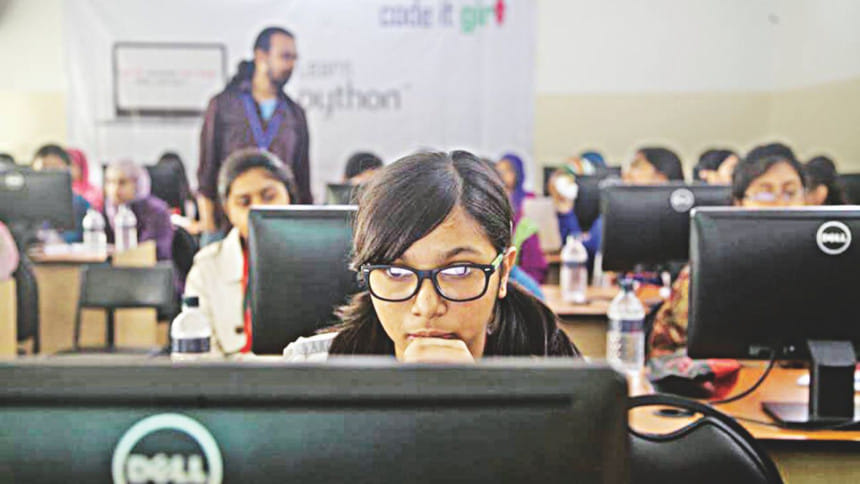Why so few? Underrepresentation of women in tech

Even before the first computer was built, English mathematician and writer Ada Lovelace published instructions for the world's first algorithm that a computer could process, becoming the first computer programmer in history. Years later, Susan Wojcicki became the 16th employee of Google, and the company worked out of her garage for its first few months. She spearheaded Google's YouTube purchase and she has been head of Youtube since 2014. Yet, women are under-represented in the computer science industry, especially in developing nations like Bangladesh. This under-representation includes not only women professionals but also students in universities.
“In co-curricular programming events and festivals, the number of female participants is significantly low, even though I have seen that many girls have immense potential in technology and computing,” says Nusrat Sultana Kakon, a computer science and information communication technology (ICT) student at Asian University for Women, Chittagong.
It appears that many women in Bangladesh tend to give up or not opt for studying and working in the computer science field, despite having an interest in the subject. There are complex reasons for this, beginning with deeply embedded societal stereotypes and cultural preconceptions. “Generally, families and teachers discourage girls from pursuing challenging jobs in computer science, engineering, mathematics, and technology because girls are told that they are not supposed to be good at these subjects. Rather, teachers and families always try to fit girls into safe, pigeon-holed jobs or homemaking,” remarks Mirfat Sharmin, senior software engineer at IP Vision Limited, and one of the founders of Code It, Girl!, a non-profitable community that works to inspire young girls to learn the art of programming.
Mirfat further argues that from their childhood, children start to pick up gender stereotypes in colours, toys, and cartoon characters from their homes, schools, television shows, and other socialisation agents. “Eventually, girls stop showing interest in science-oriented toys, in technological subjects, and in anything that has a 'boys only' trademark,” adds Mirfat. Unenthusiastic attitudes of families about girls working in computer science, and negative societal perceptions that the technology industry does not offer appropriate jobs for women, lead many to shy away from this field. Such perceptions need to be broken. “Teachers and parents have to be more careful about discriminating children based on gender. Schools need to encourage girls to participate in math and science challenges. Toy manufacturers should emphasise how they can make female-friendly science toys,” says Mirfat.
It is key that families of girls who are interested in the technology industry provide them with full freedom and practical and emotional support. Nusrat, who has been in love with computers and science from a very young age, says that her parents always inspired her to fulfill her intended goals and to even attend international conferences on computer science abroad.
Despite tremendous strides made by women in Bangladesh over the last few decades, the tech industry continues to be male-dominated. “On many occasions, I have felt that my male colleagues were able to build better networks and stronger relationships with my bosses. I didn't have the chance to network as much, and have had to pay from my own pocket for research,” says a lecturer of the department of electrical and computer engineering at North South University. Similarly, Syeda Amatul Baki, an IGSCE ICT teacher at Academia School, and former programmer at Southtech Limited, shares, “Even if women enter the ICT sector, they often end up in administrative or secretarial jobs rather than becoming engineers.” Syeda, who started her first job as a programmer in Southtech Limited in 1996 and was the first female employee in the organisation, also says that women in this profession are often underestimated for their capabilities and achievements, cast aside for being too ambitious, and have to work much harder to prove themselves. “So, women in this field really need to be persistent,” she adds.
Preparing for and joining the field of computer science and technology is no easy feat. Afreen Hossain, senior development quality assurance lead in Electronic Arts, and founder of Code it, Girl! says that it is difficult for female ICT professionals to thrive in their careers because they often cannot spend as much time as their male counterpart learning the required skills as they are overloaded with housework. “Certain social structures need adjustments, for instance, men and women need to share their responsibilities at home,” says Afreen, when asked how can female ICT professionals can manage their work during early employment, marriage, motherhood, and throughout their career.
Offering a more positive outlook on the industry, Afreen also says that if women are competent and skilled, then despite their gender, they will be able to succeed. By the same token, Achia Nila, founder of Women in Digital, a social enterprise that aims to support and promote achievements of women in ICT and empower women in the digital platform, asserts, “Working women in the ICT field need to have determination, an interest in learning challenging things, a willingness to speak up against unfair judgment, and a 'can-do' attitude.”
On the other hand, organisations need to implement policies to create more compassionate and nurturing working conditions for women. For instance, they need to provide transport facilities for employees who work long hours, promote employee diversity, and discourage gender stereotyping in the ICT sector. “Increasing women's participation in executive roles and committees, providing promotions and increments to anyone who deserves it, developing an action plan to promote growth opportunities, raising awareness among women through campaigns and seminars, and promoting careers in ICT to school-going girls are good ways,” explains Hridi Reza, a recruitment specialist at Augmedix, a telemedicine charting service for healthcare providers.
Today, attitudes in Bangladesh are changing and more and more women are being motivated to join the ICT industry. A number of groups, including Bangladesh Computer Council, World Bank, and Bangladesh Women in Technology, recognise the need for female participation in the ICT sector, and have been working to provide support and opportunities to women who want to learn and improve their technological skills. The government's ICT Division began a three-year project in January 2016 to provide ICT education to 2.4 lakh women who cannot have access to resources and training due to socio-economic hurdles.
ICT is presently an emerging sector in the country and there are a variety of merits of joining this industry. More female engagement in ICT would be largely useful at all levels, and for all stakeholders. “ICT is a great industry for women because there are a multitude of sections to choose from and specialise in. Additionally, there is an abundance of flexibility, growth, self-improvement, and work-from-home opportunities,” says Achia. It is only a matter of breaking the myths and negative perceptions, and allowing more women to join and prosper in this field.
Shababa Iqbal is a freelance journalist.

 For all latest news, follow The Daily Star's Google News channel.
For all latest news, follow The Daily Star's Google News channel. 



Comments